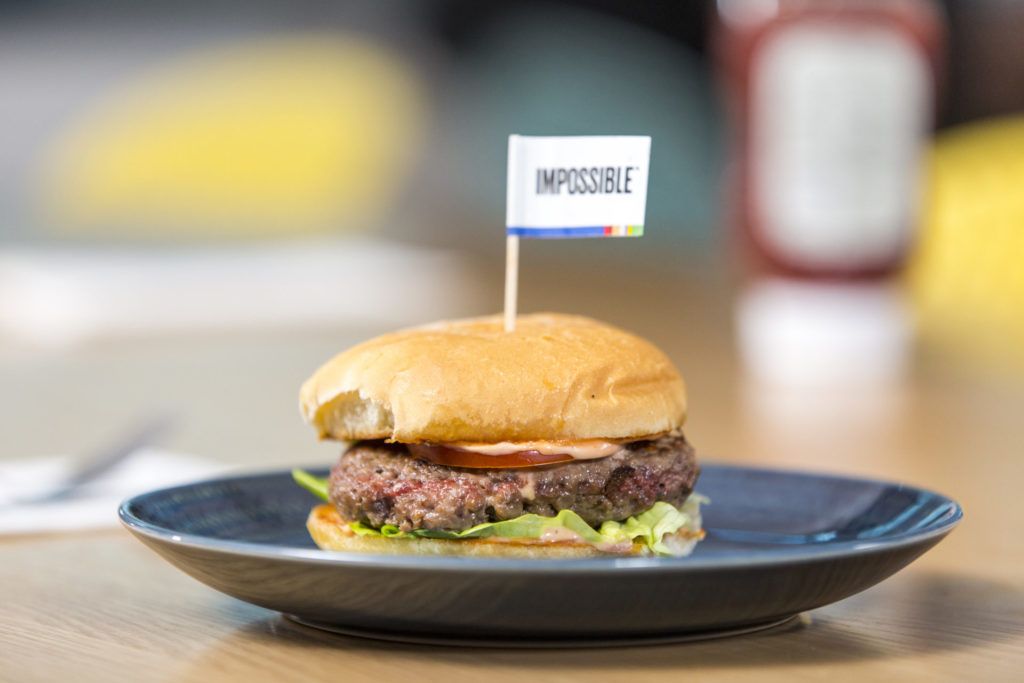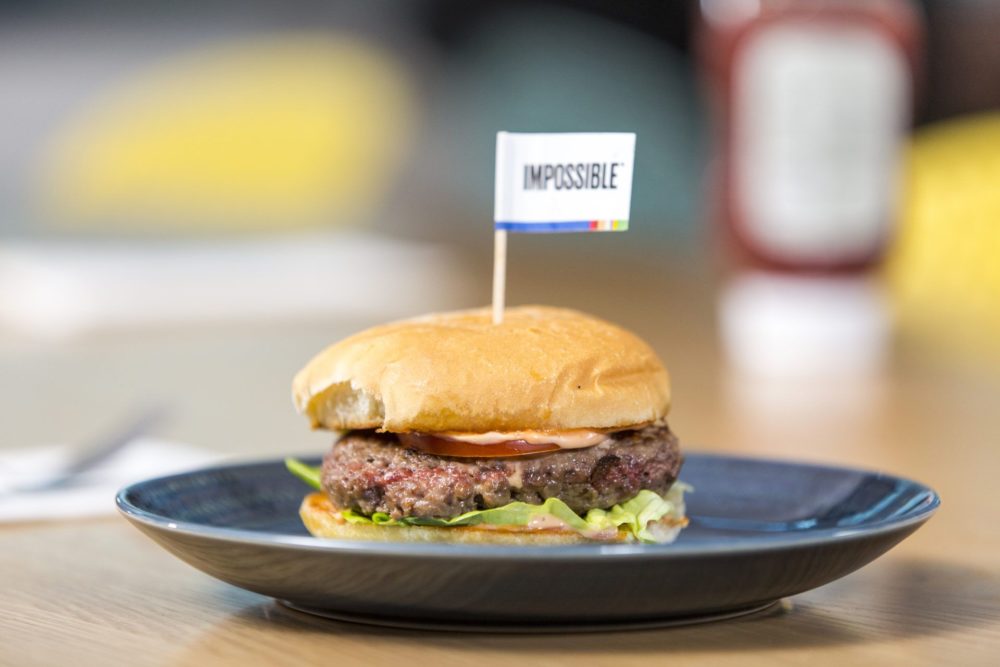Impossible Foods has sued fellow foodtech player Motif FoodWorks for patent infringement, in one of the highest-profile intellectual property (IP) disputes to date in the burgeoning alt-protein space.
In its complaint filed yesterday with the US District Court of Delaware, Impossible Foods alleges that Motif — which was spun out of Massachusetts-based bio-engineering company Ginkgo Bioworks in 2019 — has infringed “at least” one of its patents relating to the use of heme to mimic certain characteristics of animal-derived meat in plant-based substitutes.
(For a brief overview of the patent system, see the ‘On background’ section at the end of this article.)
According to its abstract, the single patent specified in Impossible’s court filing relates to “improved methods and compositions which more accurately replicate the characteristics that consumers value in the preparation and consumption of meat and which overcome the shortcomings and drawbacks of current meat substitutes.”
It describes “a beef replica product” comprising, among other things, “a muscle replica of between 0.1% and 5% heme-containing protein.”
The patent names Impossible founder and CEO Patrick Brown as one of several co-inventors of these “methods and compositions.”
The key points of Impossible’s argument:
- Impossible claims that its scientists discovered that heme is central to the taste, aroma, and mouthfeel of animal-derived meat. It describes heme as “the molecule that gives meat its bloody taste when raw and creates the intense, meaty flavors and aromas when it’s cooked.” Heme is found in nature – including in animals, where it acts as a precursor to hemoglobin, the compound responsible for carrying oxygen in the bloodstream.
- The Bay Area-based company further claims that it discovered that the addition of soy leghemoglobin — a similar compound that occurs naturally in the root nodules of soybean plants — to its products imparts many of these qualities.
- However, producing soy leghemoglobin by growing soybean plants and harvesting the substance from them isn’t commercially viable, according to Impossible. So it “developed a proprietary strain of genetically modified Pichia yeast that produces [soy leghemoglobin] through a fermentation process.”
- Motif — which was spun out of Massachusetts-based bio-engineering company Ginkgo Bioworks in 2019 — produces and sells, in its own words, ingredients and “ingredient systems” for plant-based protein products, as well as “finished formulations.”
- One of Motif’s ingredients, Hemami, also contains heme. According to a recent regulatory filing it made to the US Food & Drug Administration, Motif said its heme contains “myoglobin produced by fermentation from a modified strain of Pichia pastoris expressing the myoglobin gene from [cattle].”
- Impossible claims that Hemami made and sold by Motif and its external partners, as well as their products containing Hemami, infringe on its patent.
Why it matters:
Impossible has demanded a jury trial and is arguing that it should be awarded damages to compensate for Motif’s alleged infringement, which it claims has “irreparably damaged” its business.
- Such monetary awards are calculated on the basis of various measures of supposed economic damage to the patent holder; depending on which measures, as well as the size of the business and its market, these can run into millions or even billions of dollars (the largest patent damages award in history was the $2.54 billion jury verdict in favor of Idenix Pharmaceuticals, and at the expense of Gilead Sciences, in a 2016 dispute over hepatitis C medication; that case was also heard by the Delaware district court.)
- In this particular case, Impossible is arguing that Motif’s alleged infringement is ‘willful’ — which opens up the possibility of treble damages being awarded — and ‘exceptional,’ which means the court can also force Motif to cover Impossible’s legal costs should the latter win.
In addition to claiming damages, Impossible is requesting that the court grant it injunctive relief; namely, “ceasing manufacture, use, sale, offering for sale, and importation” of allegedly infringing products by Motif and its partners. Such an injunction could block the production and sale of any meat analog containing Hemami.
It’s easy to see how any combination of these outcomes could be crippling for Motif – perhaps even terminally.

But Motif can take countermeasures in the face of Impossible’s lawsuit. Other than making the case that there is no infringement on its part, it could also seek to invalidate Impossible’s patent: in other words, it could argue that the patent should never have been granted in the first place as it does not meet legal requirements.
Knocking out its IP protection in this way could be catastrophic for Impossible’s business.
Another possible scenario is that Impossible and Motif settle this dispute outside the ambit of a trial. The details of such out-of-court settlements are rarely made public but might involve:
- Either a one-off payment, or payment of a recurring license fee, by Motif;
- A cross-licensing arrangement by which Impossible gets access to Motif’s IP; or
- A business agreement which might involve, for instance, collaboration on products or R&D activities.
The bigger picture:
If the case goes to trial and Impossible Foods prevails, then it may be emboldened to take further legal action against other companies in the plant-based protein industry that it believes are infringing its patent. It might also be encouraged to enforce other patents covering different inventions.
Favorable results in patent disputes that are seen to ‘prove’ the strength of the company’s IP may serve as an endorsement in the eyes of investors – something that could be valuable if Impossible files for an IPO anytime soon, as has long been rumored.
However, an adverse decision could give Impossible’s competitors free rein to use its invention, potentially wrecking any competitive advantage it enabled – and spooking prospective investors.
More generally, as perhaps the first patent dispute in this space, Impossible’s complaint could be seen as something of a ‘test case’ – potentially opening the floodgates for other alt-protein companies to launch lawsuits against one another.
What they say:
“We applaud other companies efforts to develop compelling plant-based products, but we do not tolerate attempts to undermine our brand or products through the deliberate and unauthorized infringement of our intellectual property.”
Impossible Foods spokesperson
“This complaint is not supported by facts or the law and is nothing more than a baseless attempt by Impossible Foods to stifle competition, limit consumer choice, and impede Motif, a new and innovative company with significant business momentum. We intend to contest these allegations vigorously and will respond through the appropriate legal channels. We will continue to pursue our go-to-market strategy and work towards our mission to bring better tasting, nutritious, and sustainable foods to the world.”
Motif FoodWorks spokesperson
Both spokespersons told AFN that they would not comment further on the matter for now. They did not provide answers to AFN‘s specific questions on the case.
On background:
Patents are a form of IP protection for inventions (generally, this refers to technological innovation – but in certain cases can also cover business methods.)
A patent is granted by the state and gives its holder a time-limited right to exclude third parties from using the invention it covers. In return for this legal exclusivity — which can give the holder an economic advantage and typically lasts for 20 years — the holder agrees that the state can publish details of the invention.
The argument behind this system is that it is more conducive to societal progress than scenarios where businesses try to maintain a competitive advantage by keeping their inventions confidential in perpetuity (trade secrecy.)





